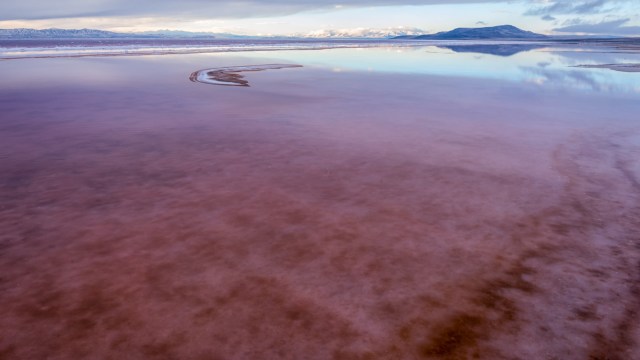
RESEARCH UNCOVERS NEW HEALTH THREAT IMPACTING MILLIONS OF AMERICANS: 'PUBLIC HEALTH NEEDS TO BE PROTECTED NOW'
New research has uncovered that Hispanics and Pacific Islanders are suffering disproportionately from toxic dust storms originating from a drying Great Salt Lake.
What's happening?
The Guardian reported on the new study, which found a disparity in the amount of particulate matter — tiny inhalable particles that can trigger a number of health problems — reaching white neighborhoods versus those with higher proportions of Hispanics and Pacific Islanders.
Furthermore, the study found that the most exposed group would see levels of particulate matter about 16% higher than the lowest if the lake fully dries out.
Why is this study important?
The Great Salt Lake is rapidly drying, making the future scenario suggested by this study more than hypothetical — by early 2023, it had already lost 73% of its water and 60% of its surface area, according to the Guardian. The water loss is mainly linked to water diversion from agriculture, mining, and home use, while a warming world also plays a role.
Meanwhile, exposure to PM2.5 — the type of particulate matter the scientists focused on for the study — can have disastrous health consequences. The inhalation of these particles is linked to cancer, respiratory problems, and circulatory disease, according to the Guardian, which adds there is no safe level of this pollutant.
One study linked PM2.5 to an estimated 135 million premature deaths worldwide between 1980 and 2020. Another study found that pregnant women exposed to fine particulate matter were more likely to give birth to underweight babies.
Fine particulate matter comes from a number of sources, according to the Environmental Protection Agency. It may come directly from construction sites, fires, or unpaved roads, or it can form in the atmosphere as a result of complex reactions of chemicals like sulfur dioxide and nitrogen oxides, which are emitted from power plants, cars, and industries.
What's being done about the drying of the Great Salt Lake?
Utah Gov. Spencer Cox recently suspended new claims for water in the Great Salt Lake basin, and the state's lawmakers have dedicated around $1 billion toward water conservation, the Guardian reported.
Still, environmentalists say this is not enough, claiming that the state hasn't created any binding measures to reduce water usage. Disgruntled conservation groups, including Earthjustice and Utah Physicians for a Health Environment, filed suit against the state in September 2023, asking the judge to order more meaningful actions.
"Public health needs to be protected now, not 30 years from now," Brian Moench, president of Utah Physicians for a Healthy Environment, said in a statement, per the Guardian.
According to the publication, people can protect themselves from PM2.5 by wearing a mask, staying inside, and using HEPA filters in HVAC systems on windy days.
Meanwhile, it's important to cut down on the amount of fine particulate matter produced to better protect our health. One way you can do this is by changing the way you get around by riding your bike more, using public transportation, or making your next car an EV. Governments are also taking action to reduce harmful pollution. Wales is banning most new roadway projects to cut down on carbon pollution, while Scotland is turning many urban neighborhoods into "20-minute cities" to give residents better access to public transit.
Join our free newsletter for weekly updates on the coolest innovations improving our lives and saving our planet.Research uncovers new health threat impacting millions of Americans: 'Public health needs to be protected now' first appeared on The Cool Down.
2024-07-27T03:43:57Z dg43tfdfdgfd